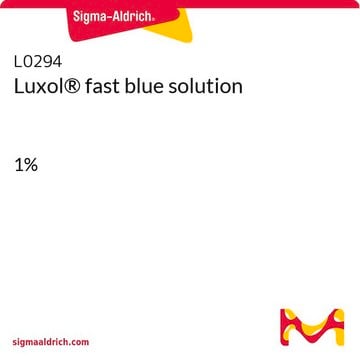S3382
Solvent Blue 38
Practical grade, powder
Synonym(s):
Luxol® Fast Blue MBSN
Sign Into View Organizational & Contract Pricing
All Photos(2)
About This Item
Recommended Products
product name
Solvent Blue 38, practical grade
grade
practical grade
Quality Level
form
powder
solubility
methanol: 1 mg/mL, blue
application(s)
diagnostic assay manufacturing
hematology
histology
storage temp.
room temp
Looking for similar products? Visit Product Comparison Guide
Related Categories
General description
Solvent Blue 38 is a phthalocyanine stain, used for staining myelin, neurons and glial fibres.
Application
Solvent Blue 38 has been used to stain tissue sections to assess remyelination.
Biochem/physiol Actions
Solvent Blue 38 exhibits a strong affinity towards bases in the lipoproteins of myelin sheath due to which it is stained blue.
Legal Information
Luxol is a registered trademark of Rohm and Haas Co.
Storage Class Code
11 - Combustible Solids
WGK
WGK 3
Flash Point(F)
Not applicable
Flash Point(C)
Not applicable
Personal Protective Equipment
dust mask type N95 (US), Eyeshields, Gloves
Certificates of Analysis (COA)
Search for Certificates of Analysis (COA) by entering the products Lot/Batch Number. Lot and Batch Numbers can be found on a product’s label following the words ‘Lot’ or ‘Batch’.
Already Own This Product?
Find documentation for the products that you have recently purchased in the Document Library.
Customers Also Viewed
Ochei Et Al
Medical Laboratory Science : Theory And Practice (2000)
Arash Sarveazad et al.
Stem cell research & therapy, 10(1), 183-183 (2019-06-27)
Evidence has suggested that human adipose-derived stem cells (hADSCs) and low-level laser has neuroprotective effects on spinal cord injury (SCI). Therefore, the combined effect of the hADSCs and laser on neuregeneration and neuropathic pain after SCI was investigated. Forty-eight adult
Collagen scaffolds modified with CNTF and bFGF promote facial nerve regeneration in minipigs
Yi Cui
Biomaterials research (2014)
Cornelia Laule et al.
NeuroImage, 40(4), 1575-1580 (2008-03-07)
Myelin water imaging (MWI) promises to be invaluable in understanding neurological diseases like MS. However, a limitation of MWI is signal to noise ratio. Recently, a number of investigators have performed MWI at field strengths higher than 1.5 T. Our
Michael JD and Mannfred AH
Handbook of Toxicology, Second Edition (2001)
Our team of scientists has experience in all areas of research including Life Science, Material Science, Chemical Synthesis, Chromatography, Analytical and many others.
Contact Technical Service








